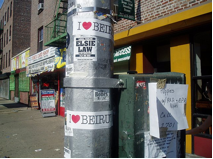There is a subtle power in anonymous messages. Slurs scribbled on walls. Letters scratched into wood. Words plastered on lampposts. Acting as muted interruptions, they jerk the lazy gaze of the passerby to attention. The I ♥ Beirut stickers were meant to do just that. In the summer of 2006, they began affixing themselves to everything from trashcans and brick walls, to bus seats and street signs. First New York and Boston, then Paris and Toronto. The heart-bearing stickers multiplied, spreading across geographic borders and finding ways to adhere themselves to the pedestrian surfaces of numerous locales. The medium as the message propagated its hard won truth and proved its effectiveness. But the power of this message is neither its ability to travel, nor its novelty. I ♥ Beirut could easily be dismissed as another rip-off of an original. Both idea and visual depiction are an obvious cooptation of the ever-present I ♥ NY campaign, created in the late 1970s by its equally ubiquitous designer Milton Glaser. The real strength of the NY slogan was never just in its ability to manifest itself on Times Square memorabilia. Its power is the reason behind the design, one that has everything to do with context. Glaser’s design came at a time when NY was least loved. With crime up, the economy down, and most of the country’s politicians sending the city to the dogs, I♥ NY was hardly created in an all-loving environment. This made its message all the more provocative. Glaser had fabricated a sentiment that didn’t exist in hopes of building a sense of morale. It’s debatable whether the image’s eventual appearance on mugs and coasters symbolized the power of its sentiment or the vigor of commerce-driven absorption. But in recent years, with the...

